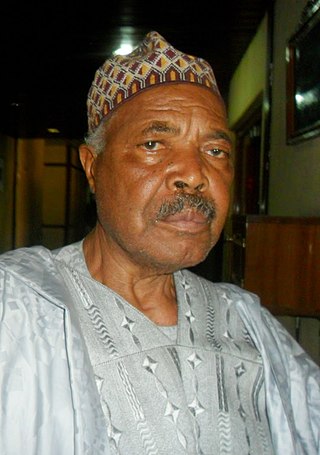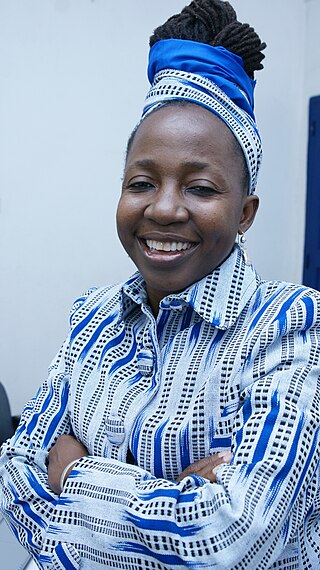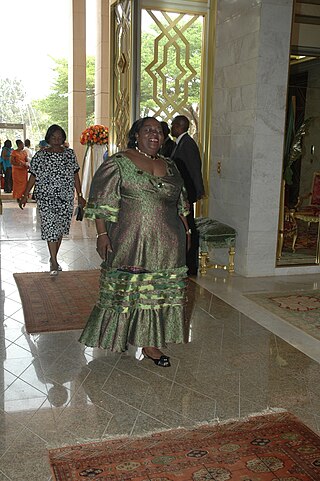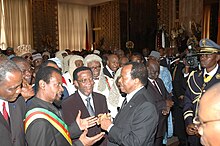
The Cameroon People's Democratic Movement is the ruling political party in Cameroon. Previously known as the Cameroonian National Union, which had dominated Cameroon politics since independence in the 1960s, it was renamed in 1985. The national president of the CPDM is Paul Biya, the president of Cameroon, while the secretary-general of the party Central Committee is Jean Nkuete.

The Social Democratic Front is the main opposition party of Cameroon. It was led by Ni John Fru Ndi from its foundation until his death in 2023, and receives significant support from the Anglophone Southwest and Northwest Regions.

Ni John Fru Ndi was a Cameroonian politician who served as first and founding Chairman of the Social Democratic Front (SDF), the main opposition party in Cameroon, from party foundation in 1990 to his death in 2023. He failed to be elected as a senator in 2013.
The Cameroon Democratic Union is a political party in Cameroon. It was founded by Adamou Ndam Njoya, a former Minister of National Education under President Ahmadou Ahidjo, on 26 April 1991.

Simon Achidi Achu was a Cameroonian politician who served as the prime minister of Cameroon from 1992 to 1996. Previously he was Minister of Justice from 1972 to 1975. A leading member of the Cameroon People's Democratic Movement (CPDM), Achidi Achu was appointed Chairman of the National Investment Corporation in 2003, and he was elected to the Senate of Cameroon in 2013.
Bello Bouba Maigari is a Cameroonian politician currently serving in Joseph Ngute's government. He was the 2nd Prime Minister of Cameroon from 6 November 1982 to 22 August 1983 and has been the National President of the National Union for Democracy and Progress (UNDP) since January 1992. Although he was a key opposition leader for much of the 1990s, he has participated in the government since December 1997; he was Minister of State for Industrial and Commercial Development from 1997 to 2004, Minister of State for Post and Telecommunications from 2004 to 2009, and Minister of State for Transport from 2009 to 2009. Since December 2011, he has been Minister of State for Tourism and Leisure.

Parliamentary elections were held in Cameroon on 22 July 2007, with voting in some districts re-run on 30 September. Local elections were held on the same day, with seats on 363 town councils at stake. The result was a victory for the ruling Cameroon People's Democratic Movement (RDPC), which won 153 of the 180 seats in the National Assembly, whilst the main opposition party, the Social Democratic Front (SDF), won 16 seats.
Augustin Frédéric Kodock was a Cameroonian politician who was Secretary-General of the Union of the Peoples of Cameroon from 1991 to 2011. He worked in Cameroon's state administration during the 1960s and then worked at the African Development Bank through the 1970s. After a stint as head of Cameroon Airlines in the mid-1980s, he participated in the beginnings of multiparty politics in the early 1990s, becoming Secretary-General of the UPC. Allying himself with President Paul Biya, he was appointed to the government as Minister of State for Planning and Regional Development from 1992 to 1994 and then as Minister of State for Agriculture from 1994 to 1997. Subsequently, he was again Minister of State for Agriculture from 2002 to 2004 and Minister of State for Planning from 2004 to 2007.
The Progressive Movement is a minor opposition political party in Cameroon. It was formed on 23 August 1991 and is led by Jean-Jacques Ekindi.
The National Union for Democracy and Progress is a political party in Cameroon, drawing its main support from the north of the country. It was established as an opposition party in the early 1990s and won the second largest number of seats in the 1992 parliamentary election. The UNDP's National President is Maigari Bello Bouba, who is currently a Minister of State in the government.

The 2008 Cameroon protests were a series of violent demonstrations in Cameroon's biggest cities that took place from 25 to 29 February 2008. The protests followed on the heels of a strike by transport workers, who were opposing high fuel prices and poor working conditions. Further political turmoil had been caused by President Paul Biya's announcement that he wanted the constitution to be amended to remove term limits; without such an amendment, he would have to leave office at the end of his term in 2011. Large groups of youths, whom the opposition Social Democratic Front (SDF) political party and the government blame one another for organising, took to the streets of Douala, Yaoundé, Bamenda, and other major cities, looting and vandalising property. The government sent in troops to crack down on the unrest, and protesters and troops alike were killed. The official government tally is that 40 people were killed, but human rights groups claim that the total is closer to 100. Government figures place damage to property at tens of billions of francs CFA.
René Emmanuel Sadi is a Cameroonian politician who has served in the government of Cameroon as Minister of Territorial Administration since 2011. Under President Paul Biya, he was Second Assistant Secretary-General of the Presidency from 2004 to 2009 and Minister for Special Duties from 2009 to 2011. Sadi also served as Secretary-General of the Central Committee of the Cameroon People's Democratic Movement (RDPC), the ruling political party in Cameroon, from 2007 to 2011.
Christopher Kiloh Fai Nsahlai was a Cameroonian politician and diplomat. A member of the Cameroon People's Democratic Movement (CPDM), he was Cameroon's Ambassador to the Central African Republic from 1985 to 2001, Minister of Transport from 2001 to 2002, and Board Chairman of the Autonomous Port of Douala from 2006 to 2008.

Cavayé Yéguié Djibril is a Cameroonian politician who has been the President of the National Assembly of Cameroon since 1992. He is a leading member of the Cameroon People's Democratic Movement (CPDM).
Grégoire Owona is a Cameroonian politician who has served in the government of Cameroon as Minister of Labor and Social Security since December 2011. He previously served as Minister-Delegate at the Presidency for Relations with the Assemblies from 1997 to 2011, and he has also been Deputy Secretary-General of the Central Committee of the Cameroon People's Democratic Movement (RDPC) since 1992.

Parliamentary elections were held in Cameroon on 30 September 2013, alongside local elections. They were originally scheduled for July 2012, February 2013 and July 2013, but were repeatedly postponed.

Edith Kahbang Walla, popularly known as Kah Walla, is a Cameroonian politician, entrepreneur and social activist. She went into politics in 2007 with the Social Democratic Front (SDF), the then main Cameroonian opposition party and was then elected into the municipal council of Douala I. In 2010, she resigned from SDF following a divergence over strategy and declared her intention to run for the 2011 presidential election on October 23, 2010. On April 30, 2011, she was elected as the president of the Cameroon People's Party (CPP) and party candidate for 2011 presidential election.

Joshua Osih is a Cameroonian politician. He was the vice president of the main opposition party in Cameroon, the Social Democratic Front (Cameroon) (SDF), and the first Anglophone Cameroonian to serve as a Parliamentarian in Douala, capital of the Littoral Region (Cameroon) in 2013. He is also the chairman of Camport PLC in Cameroon.

Narcisse Mouelle Kombi, born on May 6, 1962, in Douala, is a Cameroonian academic and writer. Associate of public law and political science, professor at the University of Yaounde II, he was appointed Minister of Arts and Culture of Cameroon on October 2, 2015 in the government of Philemon Yang.

Françoise Foning was a Cameroonian businessperson and politician for the Cameroon People's Democratic Movement (CPDM). She began a career in business at age 12, opening a restaurant before entering into the tourism, transportation, food, medical and education sectors. Foning became president of CPDM's women's division in 1992 and was appointed the party's leader in Douala and the national committee five years later. In 2002, she was elected deputy mayor of Douala II and began serving in the National Assembly that same year. Foning led the African Network and Cameroonian Businesswomen and consulted The World Bank, the African Development Bank along with several international agencies. She was founding president of the Association of Cameroonian Businesswomen and the NGO World Female Company Managers. A street in Douala was named in her memory.










